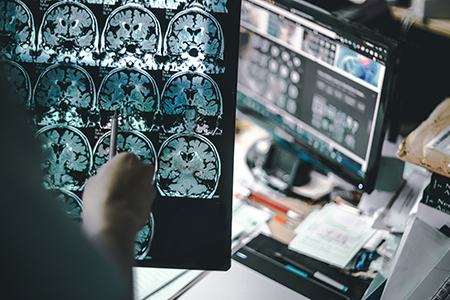 It is estimated that 5.8 million Americans are currently living with Alzheimer's Disease (AD). AD is a progressive, lifelong condition for which there is currently no cure. Treatment consists of managing the symptoms associated with the disease and include medicines that aim to maintain mental function, manage behavioral symptoms, and slow down memory loss1,2.
It is estimated that 5.8 million Americans are currently living with Alzheimer's Disease (AD). AD is a progressive, lifelong condition for which there is currently no cure. Treatment consists of managing the symptoms associated with the disease and include medicines that aim to maintain mental function, manage behavioral symptoms, and slow down memory loss1,2. Many clinical trials are currently active in the study of AD-related drugs. One trial, which is currently recruiting participants, aims to test the efficacy of injecting viral particles carrying cDNA for apolipoprotein 2 (ApoE2). The idea behind this is if this protein can replace a slightly different ApoE variant (ApoE4), which has been highly correlated with the development of AD, symptoms will decrease and disease progression could be slowed.
APOE and Genetic Risk Factors for AD
While AD is a complex and possibly multifactorial disease, one specific gene has been identified as a risk factor for developing the disease. The APOE gene, which has also been linked to the development of cardiovascular disease, encodes for three different protein variants. The gene itself has three alleles and the risk of developing the disease is much different depending on which ones are inherited. All three ApoE proteins are involved in cholesterol transport in the brain:- APOE2 — the rarest allele; has been shown to reduce the risk of developing AD by up to 40%
- APOE3 — the most common allele; does not affect the risk of developing AD
- APOE4 — present in 10-15% of the population; has been shown to increase the risk of developing AD and lowers the age of onset of the disease
Clinical Trials for AD Gene Therapy
"Gene Therapy for APOE4 Homozygote of Alzheimer's Disease" (NCT03634007) is actively recruiting patients that have two copies of the APOE4 gene. The study will assess the efficacy, safety, and toxicity of a viral injection into the cerebrospinal fluid.This adeno-associated virus (AAV, serotype rh.10) will be used as a carrier for cDNA encoding ApoE2. In 2016, the same group conducting this clinical trial published a preliminary study in mice in the journal Neurobiology of Aging. The team found that three-month-old Apoe knockout (EKO) mice and APOE2 targeted replacement (TRE2) mice with Aβ plaques characteristic of AD showed decreased amyloid burden after injection with viral particles carrying the APOE2 gene variant5. Shortly after, a study was conducted in non-human primates that also demonstrated promising results6.
This study is a clear example of how animal models of human disease can be used to help develop novel therapeutics.















.jpg)

.jpg)
.jpg)
.jpg)
.jpg)





.jpg)


.jpg)
.jpg)

.jpg)


.jpg)





.jpg)

.jpg)



